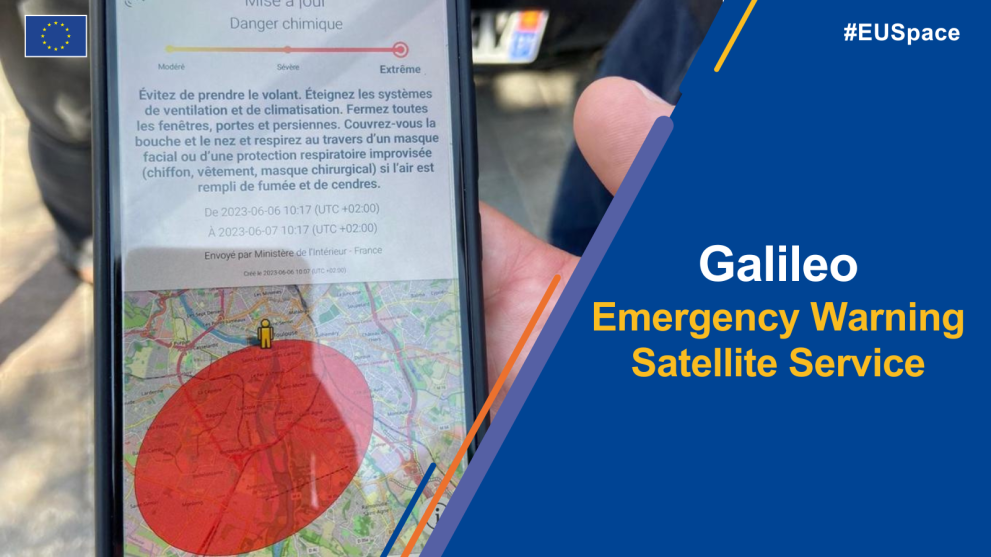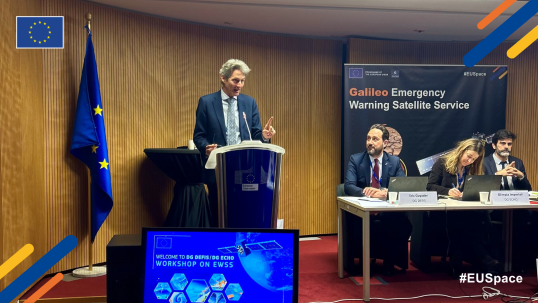
In a world in which the frequency and impact of “natural” and human-caused disasters are on the rise, the European Union (EU) is stepping up its efforts to further improve emergency communication systems with the introduction of the Galileo Emergency Warning Satellite Service (EWSS). This service will ensure the delivery of critical alerts when traditional ground-based systems are compromised.
The European Union, through the EU Space Programme, has consistently demonstrated its ability to leverage space technology to protect its citizens. Initiatives such as the Copernicus Emergency Management Service (CEMS) and Galileo's Search and Rescue (SAR) service have significantly improved disaster response capabilities across Europe and beyond and ensured that individuals in distress can be located and assisted promptly, and that emergency managers are provided with up-to-date geospatial information. CEMS provides critical satellite-based data for managing natural disasters, humanitarian crises, and human-caused emergencies. Meanwhile, Galileo's SAR feature, integrated into the COSPAS-SARSAT system, significantly improves the detection and localisation of distress signals, facilitating faster and more efficient rescue operations. The upcoming Galileo Emergency Warning Satellite Service (EWSS) is the latest addition in the effort to use space technology for the common good.
Galileo, the EU global navigation and timing system, has become known for its high accuracy and reliability in global positioning as well as for providing innovative services. Unlike other navigation systems, Galileo is completely under civilian control, evolving with the needs of its users. With both natural and human-caused disasters becoming increasingly common, the need for robust and reliable early warning systems is clear. Traditional alert systems, while very effective in most cases, could be hampered by network congestion, damage to infrastructure, or simply not available due to geographical isolation. Galileo EWSS is designed to complement existing systems, ensuring that when all else fails, emergency warning messages still get through to the population, including in difficult communication scenarios. The introduction of EWSS is a demonstration of Galileo’s ability to evolve with the needs of its users, developing new services to meet the demands of resilience, security, and safety.
How is Galileo EWSS different from other emergency warning systems?
At the core of the value proposition of EWSS is its ability to remain operational under extreme conditions that would incapacitate conventional alert systems. This resilience is crucial, especially in the immediate aftermath of natural disasters such as earthquakes, floods, or wildfires, for which the ability to deliver critical alerts with proper guidance becomes a lifeline. On top of the various alert systems operated within EU Member States, such as cell broadcasts, SMS, sirens, the Internet, and social media, the EWSS introduces a significant layer of redundancy, as it is independent from terrestrial mobile networks and can transmit alerts to any smartphone with a GNSS chip located within a chosen target area. EWSS Manager at the European Commission, Eric Guyader, indicates: “For reaching the highest number of people in case of danger, it is commonly agreed that the more alert systems, the better. This new alert system via our Galileo satellites will be put at the disposal of national authorities, which will decide whether to use it, how, and when." The key advantage of being available everywhere and at all times on Earth will be particularly beneficial for individuals in remote and rural regions of Europe, including in overseas territories, where mobile signals may sometimes be weak or absent, and proves lifesaving when traditional terrestrial alert systems fail due to high traffic, power cuts, or damage, as often occurs during natural disasters.
The road to service declaration
With service declaration planned for 2025, the Directorate General for Defence Industry and Space (DG DEFIS) has actively engaged in 2023 and 2024 with Member States through a demonstration campaign. This campaign has served not only to fine-tune the service but also to foster a collaborative environment in which feedback from national civil protection experts can be integrated into the final implementation. A total of four demonstration events were conducted in France, Germany, Cyprus, and most recently Belgium/Luxembourg, with alerts being successfully transmitted and received in under a minute. This rapid dissemination of information is crucial in emergency situations, when every second matters. Once operational, EWSS will be offered free of charge to national civil protection authorities in all EU Member States.
Following the conclusion of the demonstration campaign, The European Commission’s Directorate-General for Defence Industry and Space (DG DEFIS) in cooperation with DG ECHO (European Civil Protection and Humanitarian Aid Operations) organised a final workshop in Brussels on 10 and 11 April 2024, in order to draw lessons from the four demonstrations, share views with Galileo actors and amongst the EU national civil protection community, as well as prepare the next steps for 2024 and 2025.
The workshop had the following objectives:
- for the Commission to consolidate the service with a last round of feedback with national civil protection experts;
- for EUSPA to present the next steps of the service implementation;
- for EU Member States to provide feedback, receive the latest information on the programme implementation roadmap and find answers as to the end-to-end service concept and connection requirements to the Galileo infrastructure.
Paul Flament, Head of Satellite Navigation Unit at the Directorate General for Defence Industry and Space stated: “The demo campaign confirmed that the EWSS concept meets the expectations of the civil protection community”. He added: “the prototyping phase is now over: all activities for a future service roll-out have already started”.
Michela Matuella, Director at DG ECHO said: “Effective Public Warning Systems (PWS) save lives. I strongly believe in the benefit of a multi-channel public warning system to maximise the outreach of alerts to population. ''Galileo Emergency warning Satellite Service is one of the main concrete examples of initiative in the field of early warning systems that allows the Commission to complement Member States’ efforts and contribute to the Union Disaster Resilience Goal'', she added.
A safer, more resilient future for all European citizens
As the EU continues its work with its Space Programme to leverage satellite technology for socioeconomic benefit, Galileo EWSS is a concrete example of the progress being made. EWSS is the latest addition to a host of space-based services that aim to improve disaster preparedness and response. This month’s workshop marks the end of the demonstration phase of EWSS, bringing us closer to implementation. Once operational, the Galileo Emergency Warning Satellite Service (EWSS), alongside existing alert systems, will help to make the EU more resilient in the face of growing “natural” and human-caused disasters.
Details
- Publication date
- 11 April 2024
- Department
- Directorate-General for Defence Industry and Space

